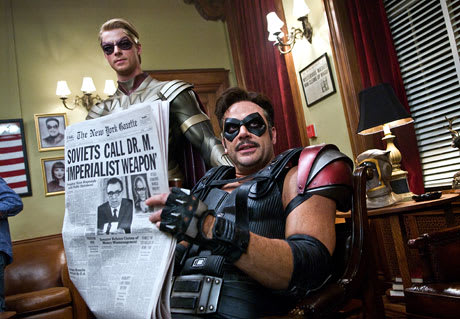This third iteration of Watchmen ― after a three-hour theatrical cut, with another half-hour added to an initial DVD director's cut ― is designed to put an end to fan geek griping about what is and isn't included in the movie from the classic graphic novel by Alan Moore and Dave Gibbons. And since it is geared to those who've pored over every frame of the 12-issue comic, I won't bother with plot recaps and will just go ahead and assume that you've thumbed through its pages a time or 12. Simply put, Ultimate Cut is the ultimate argument in favour of Zach Snyder's original theatrical cut. The choices made ― particularly excising the Black Freighter comic that occurs within the narrative ― were for specific filmmaking reasons, not dissimilar to the ways in which Moore and Gibbons were writing Watchmen partially as an exercise to demonstrate exactly what a comic could do that no other media could. This Ultimate Cut not only adds all the "director's cut" material ― some of which is good, interesting, and worth inclusion ― but intersperses the Black Freighter story as an animated sequence in its appropriate spots. That means that the newsstand is also back in the story, which should please detail-oriented fans who will scour the background for appropriate comic-inspired posters or billboards. It also brings the movie ― as a movie ― to a screeching halt. (They wisely left Hollis Mason's memoir, Under the Hood, as an extra here.) A four-hour movie is not, and cannot replace the experience of, a 12-issue comic. But here, almost to silence geeks who just want every frame of their beloved Watchmen brought to screen, is every moment in all its literature-reducing lack of glory. In the graphic novel, the Black Freighter story serves several functions. It comments on the comic itself, as main narrative text overlaps with Black Freighter visuals and vice versa, something that's obviously impossible in the film. It provides a pop cultural answer to the literature of this world ― if superheroes are real, commonplace and flawed, what do young people read for escapist entertainment? The chilling answer: pirate stories featuring brutal gore, bloated corpses, loneliness and terror. No coincidence. As a fleshed-out, animated film released separately a few months ago, the Black Freighter was another of director Zach Snyder's fan boy flights ― the ability to realize a different aspect of the story simply because he could. He's put it back into the film for the same reason, but does damage to his near-masterpiece in the process. Yep, as an original film, Watchmen (in either its theatrical or initial director's cut) is as near to a great Watchmen film as can be made. It's not flawless, yet the fatality of those flaws remains the perspective of the viewer. (In my opinion, the worst flaw is the casting of small, effete Matthew Goode as Ozymandias, a figure who's supposed to be the smartest, most charismatic, most famous person on Earth; it's the lone part that necessitated a movie star.) Snyder's greatest accomplishment is making the hard choices required of it as a movie, not his slavishly meticulous attention to detail (in itself still impressive). This Blu-Ray release touts itself as a four-disc extravaganza but don't be fooled: there are new commentaries by both Snyder and illustrator Dave Gibbons, and featurettes include already released material like an examination of the comic's legacy and internet video journals. It adds a kinda cool look at the physics of Watchmen, plus the Under the Hood featurette released with the Black Freighter extended story released earlier. One of the final two discs is a digital copy of the theatrical cut (useful to have on hand, since it's better), and the other is a "motion comic" of Watchmen, which deserves its own scorn. Not that it's bad, or badly done, but the very concept of the "motion comic" is fundamentally horrible, like a graphic novel for those too lazy to learn to read. It's not animated; it simply moves still images around in animated-looking ways while voice actors recite dialogue. It retains none of the still, composed beauty of the comic ― it retains none of the art ― and yet isn't an animated version either. Not a diss on the Watchmen version specifically, but an argument against these neither fish nor fowl abominations.
(Warner)Watchmen: The Ultimate Cut [Blu-Ray]
ZacK Snyder

BY James KeastPublished Jan 7, 2010